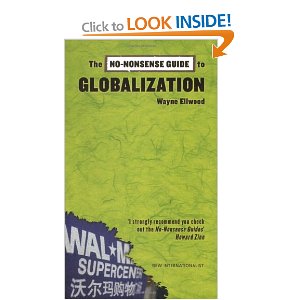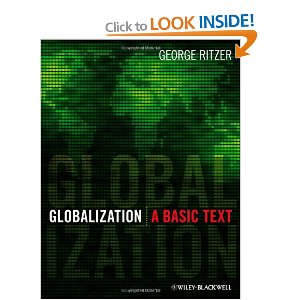Archive for November 24th, 2012
Globalisation and Global Politics no comments
Having taken some time out to consult my current notes and research I came to the conclusion that there are three areas that still need more development before I will begin writing out my Interdisciplinary Review. I need to; gain an understanding of globalisation, find a stronger core-text discussing Politics and find a more comprehensive examination of Facebook. For this week’s post I will discuss my readings on globalisation and the remaining topics will be discussed in the order above in the subsequent weeks to come.
The No-Nonsense Guide to Globalization – Wayne Ellwood

This book provides a great overview of the basic notions involved in globalisation and global politics. Though the book does take a somewhat biased view (the author clearly has some anti-globalisation sentiments) the text is easily understandable and details much of the impact and direction of globalisation through recent history. It is written essentially as an American counterpart to the “Very Short Introductions” discussed previously.
Two notions in particular struck me as applicable to discussions of social networking. Firstly, Ellwood notes that the process of globalisation has changed over time. Means of travel, trade, and interaction (languages) have changed dramatically even in recent years and this has greatly modified the way in which globalisation takes place. There are some parallels between this idea and how social networking has integrated with peoples lives. Where previously computers were the terminal of access to your social network now phones, games consoles and various other extraneous devices such as cameras all provide similar or alternative means to access this network. Just as we see the process of globalisation changed by the advances in communication we may expect similar implication for the rates and direction of expansion seen in social networks as our interactions with these networks change. Before discussing the second point I will introduce the second book I have consulted on the topic of globalisation:
Globalization- A Basic Text – George Ritzer

This book provides a significantly more detailed approach to globalisation however, one recurring theme becomes apparent that is seen in both Ellwood and Ritzer’s books and across the topics of discussion within the context of globalisation: control.
Globalisation can be argued to be a positive tool of expansion but this also often results in restrictions being imposed on those that live beneath its shadow. Examples such as the “Tobin Tax”, a tariff charge used to impose restrictions on the flow of wealth between globalised and globalising peoples. Though originally intended to protect the interest of citizens this can also have negative effects by impinging on people ability to interact freely or restricting the ways in which they interact to only those interactions deemed “acceptable”. This theme is seen throughout discussions of globalisation particularly involving issues like imperialism. To what extent do emerging global powers control the restrict the development of global culture by imposing their own norms upon others? Does such a trend exist in social networks with popular networks buying up smaller ventures before they can compete or by forcing users to become dependant on their structure by tying multiple online identities to a single social network user account? Are these kinds of effects deliberate or the natural outcome of expansion? Do networks impose restrictions on each others use just as nations states do on their citizens?
Whilst globalisation provides one useful area of discussion within the context of politics I still feel that I need a stronger political text to support my discussion of the topic. The next post to come will be a discussion of this text.